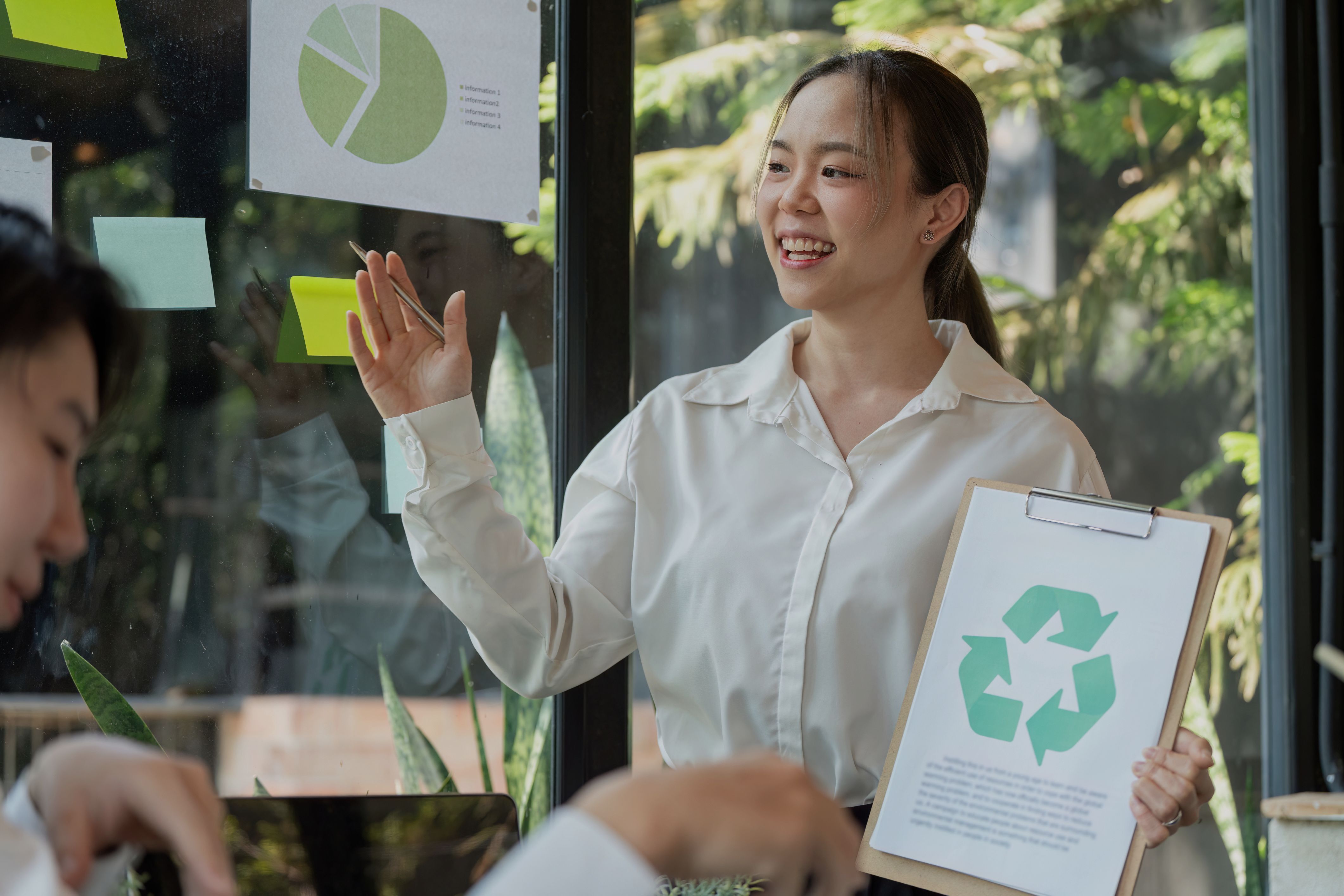Sustainability is one of those words you hear everywhere these days, so much that it’s almost become a buzzword. Yet it’s important to make sure this crucial term doesn’t lose its meaning and purpose. As embedded in the word itself, sustainability is about the ability to sustain – using resources responsibly so we can meet our needs today without making it harder for future generations to meet theirs.
In business, this concept is now more important than ever. As companies face increasing pressure from stakeholders, regulators, and consumers, sustainability in business has evolved to a genuine necessity. It’s not just about doing good – it’s about building long-term success, managing risks, and staying competitive in a world that demands more responsibility.
But what does sustainability actually mean in a business context, and why is it so important?
In this blog post, we’ll dive into what sustainability really looks like in business today – and why adopting sustainable practices is so crucial for companies’ success.
Table of Contents
What is Sustainability in Business?
At its core, sustainability in business means thinking beyond short-term profits to understand how decisions impact people and the planet. It means building environmental, social, and economic responsibility into everyday operations and long-term strategies. This holistic approach helps ensure a company can thrive while minimising its environmental footprint and contributing positively to society.
A common way to think about this balance is through the idea of Profit, Planet, and People – the three pillars of sustainability:
- Profit (Economic Sustainability): This isn’t just about making as much money as possible right now. It’s about building a healthy, resilient business that can adapt and thrive in the long term. This means managing resources wisely, investing in innovation, and creating economic growth that benefits everyone – not just shareholders.
- Planet (Environmental Sustainability): This pillar is all about reducing your impact on the environment. That can mean cutting carbon emissions, saving energy and water, managing waste responsibly, and using renewable resources. Greener practices not only help protect the environment but can also drive efficiency and lower costs.
- People (Social Sustainability): This focuses on the well-being of employees, customers, and communities. It includes fair wages, safe working conditions, respect for human rights in the supply chain, and supporting diversity and inclusion. It’s also about building trust through ethical and responsible practices.
When businesses take a balanced approach to sustainability, it’s not only beneficial for the world – it also supports their long-term success.
Increasingly, this is what customers, employees, and investors are looking for – encouraging companies to take action. Let’s explore how some of these expectations are evolving.
Stakeholder Expectations
- Customers increasingly look for brands that align with their values, choosing products and services that are responsibly made and transparently sourced. They’re quick to call out greenwashing and reward genuine commitment.
- Employees want to work for companies that prioritise more than just profits. A strong sustainability strategy can help attract and retain talent who care about purpose, ethics, and positive impact. In fact, studies show that 60% of Millennial and Gen Z employees say they would take a pay cut to work for a company that prioritises environmental sustainability.
- Investors and regulators are also demanding more transparency and responsibility. ESG (Environmental, Social, and Governance) criteria are becoming standard measures of business performance and risk management, pushing companies to prove they can operate sustainably in the long term.
The Business Case for Sustainability
Beyond meeting expectations from customers, employees, and investors, there are practical reasons why sustainability makes good business sense.
- Efficiency and Cost Savings: Sustainable practices often mean using resources more wisely. Cutting waste, saving energy, and streamlining operations can lower costs while reducing environmental impact. Investing in greener technologies can pay off with long-term savings and greater resilience.
- Managing Risks: Ignoring environmental and social issues can lead to supply chain disruptions, legal trouble, or new regulations that catch companies off guard. By planning ahead and addressing these challenges early, businesses can reduce uncertainty and avoid costly surprises.
- Building Long-Term Resilience: Sustainability isn’t just about solving today’s problems – it’s about being ready for the future. Companies that prioritise it tend to be more adaptable and better equipped to handle changing markets and expectations. Investing in sustainable practices now can help secure a stronger foundation for long-term success.
Real-world Examples Across Industries
As sustainability is becoming a core part of how businesses operate across industries, many companies are taking real steps to reduce their environmental impact and rethink their business models.
Here are a few examples of companies in different sectors that are leading the way with innovative and meaningful practices.
Patagonia
Outdoor clothing company Patagonia is famous for making sustainability central to its brand. From using recycled materials to running repair and resale programs, they encourage customers to buy less and extend product life. They also donate profits to environmental causes and advocate for systemic change with their bold mission: “We’re in business to save our home planet.”
IKEA
IKEA has set ambitious goals to become climate positive by 2030. The company focuses on sourcing sustainable materials like certified wood and cotton, using renewable energy in its stores, and offering buy-back and resell programs to promote a circular economy. These initiatives aim to reduce environmental impact while making sustainable living accessible to more people.
Microsoft
Microsoft has committed to becoming carbon negative by 2030, meaning it will remove more carbon than it emits. Beyond reducing its own footprint, Microsoft is investing in AI tools and technologies to help other industries monitor and reduce environmental impact. The company also plans to remove all the carbon it has ever emitted by 2050.
Apple
Apple is working to make its entire supply chain carbon neutral by 2030. The company already uses 100% recycled aluminum in many of its products and is pushing suppliers to adopt renewable energy. With strong sustainability reporting and design choices that prioritise recycling and energy efficiency, Apple aims to lead the electronics industry toward a greener future.
Unilever
Unilever integrates sustainability across its vast portfolio of brands, with goals like sourcing 100% sustainable palm oil and reducing plastic packaging. The company also focuses on cutting greenhouse gas emissions throughout its operations and supply chains. Unilever’s approach combines environmental responsibility with social sustainability, including fair wages and safe working conditions.
Siemens
Siemens develops technologies that help industries reduce their environmental impact, from energy-efficient manufacturing systems to smart grid solutions. The company also uses AI and data analytics to improve resource use and lower emissions. By supporting its customers’ sustainability goals, Siemens plays a crucial role in decarbonising the industrial sector.
These are just a few examples of how companies are adapting their business strategies around ESG frameworks. But it’s not just companies that need to adapt – it’s people too. Understanding the principles of sustainable business is becoming a valuable skill set across roles and industries.
Why building your Sustainability Skills matters
Whether you’re leading a team, working in operations, marketing, or product development, having a solid grasp of sustainability can help you make better decisions, collaborate more effectively, and identify new opportunities.
By investing in your own learning, you’re not only helping your organisation navigate change – you’re also building your ability to contribute meaningfully to a more sustainable future.
Taking the next step toward Sustainability
Sustainability in business has shifted from being a nice-to-have to an essential part of doing business. It’s about meeting expectations, building resilience, and making a positive impact.
By understanding the principles and learning from real-world examples, companies can turn challenges into opportunities and help shape a better future.
Curious to learn more?
Explore Hyper Island’s Sustainability Change Leadership and Circular Service Design Upskill Courses to gain the tools, confidence, and mindset to make a difference.


WANT TO GET NOTIFIED ABOUT OUR EVENTS?
Join our mailing list for tips, events, and opportunities.

